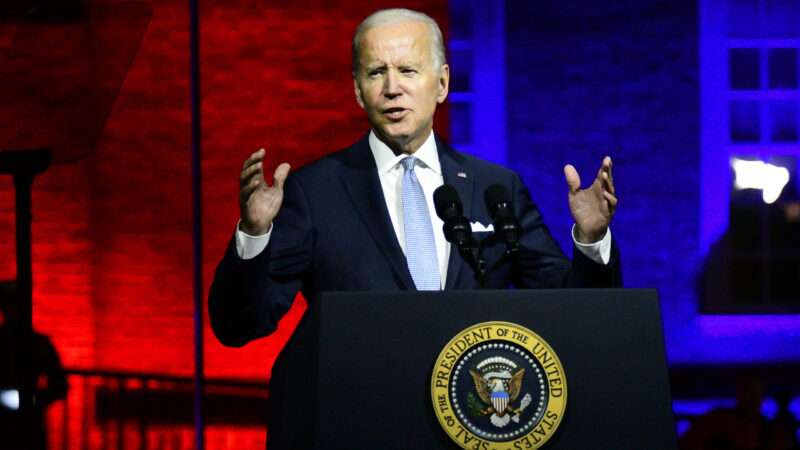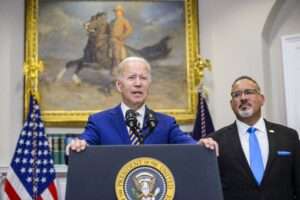

In 2019, then-President Donald Trump used a dubious emergency declaration to try to divert funds to build his border wall, despite the fact Congress had repeatedly refused to authorize any such expenditure. As I wrote at the time, Trump's emergency declaration was bogus because there was no genuine emergency, the relevant statutes didn't give him the power to transfer military funds even if he could declare an emergency, using eminent domain to build a border wall would cause grave harm to Americans as well as migrants, and Trump's actions could set a dangerous precedent, if allowed to stand. Liberal Democrats also condemned Trump's border wall diversion, citing many of these same considerations. Then-candidate Joe Biden was among them.
Several court decisions ruled against Trump on the merits (see my analysis here and here), though other courts rejected challenges to the border wall diversion on procedural grounds. Ultimately, the issue was resolved when President Biden ended the border wall diversion upon taking office, and Congress enacted legislation preventing future shenanigans of this type.
Unfortunately, President Biden's recent decision to cancel up to $600 billion in student loan debt for borrowers earning up to $125,000 per year ($250,000 for married couples) has much in common with Trump's border wall diversion. It too uses a dubious assertion of emergency powers to circumvent Congress' power of the purse in order to promote a harmful policy the president could not have pushed through otherwise. As Elizabeth Goitein, a leading liberal expert on emergency powers, points out in the Washington Post, in both instances the president was using emergency powers to "to get around Congress, when Congress has considered a course of action and rejected it."
As policy, Biden's loan cancellation plan is every bit as dubious as Trump's border wall. It's likely be a huge waste of resources at a time when we are already facing a looming fiscal crisis. It is highly regressive (especially, if as progressive Washington Post columnist Catherine Rampell points out, you consider beneficiaries' likely lifetime earnings, as well as their current incomes). Economist Jason Furman, former Chair of President Obama's Council of Economic Advisers, argues that it will make inflation worse. It also creates perverse incentives for universities and future college students, both of whom will face less pressure to cut already bloated education costs. For these reasons, the left-liberal Washington Post editorial board is right to decry the loan cancellation as a "regressive, expensive mistake."
Like Trump's wall-building project, Biden's loan cancellation plan is a policy beloved by the president's base, but likely to inflict grave harm on innocent people for no good reason. In one case, the victims are property owners and migrants. In the other, taxpayers and low-income workers hurt by inflation.
Biden has, however, managed to outdo Trump in the sheer scale of his raid on the treasury. Whereas the "former guy" (as Biden calls him) sought to divert about $10 billion in Pentagon and drug interdiction funds to the border wall, Biden's loan forgiveness plan exceeds that sum many times over, possibly shelling out as much as $600 billion. Biden is making executive usurpation of Congress' spending power great again - indeed, even greater than under Trump!
Admittedly, Trump's plan might still have been even worse, if you consider the non-pecuniary costs, such as losses to property owners and migrants, as well as costs to the Treasury and taxpayers. But that's damning Biden's plan with very faint praise, indeed.
The legal justification for Biden's plan also rivals Trump in its bogus reliance on emergency powers. The Justice Department's legal rationale for the plan relies on a provision of the 2003 HEROES Act, enacted in the wake of the 9/11 attacks, which gives the secretary of education the authority to "waive or modify any statutory or regulatory provision applicable to the student financial assistance programs" in order to ensure that, as a result of a war or national emergency "recipients of student financial assistance under title IV of the Act who are affected individuals are not placed in a worse position financially in relation to that financial assistance because of their status as affected individuals."
The statute defines "affected individuals" as anyone who is "(A) is serving on active duty during a war or other military operation or national emergency; (B) is performing qualifying National Guard duty during a war or other military operation or national emergency; (C) resides or is employed in an area that is declared a disaster area by any Federal, State, or local official in connection with a national emergency; or (D) suffered direct economic hardship as a direct result of a war or other military operation or national emergency, as determined by the Secretary." The administration's argument is that most beneficiaries of the loan forgiveness plan come under D, in the sense that they have suffered "direct economic hardship" as a result of the Covid-19 pandemic, the "national emergency" in question. It also claims that virtually everyone in the United States qualifies under C, because, in March 2020, then-President Trump declared the entire country a "disaster area" because of Covid.
But whether they are "affected individuals under C or D, loan debt cancellation is still only permissible if the pandemic put them "in a worse position financially in relation to that financial assistance." For the overwhelming majority, there is simply no proof that Covid is preventing them from paying back their loans or even making it significantly harder to do so. As the Washington Post points out, the unemployment rate for college graduates is just 2 percent. Only a small minority of loan recipients actually suffered anything like sufficient "economic hardship" as a result of Covid to significantly affect their ability to repay their loans. Ditto for the proportion who had trouble repaying merely because they were present in a "disaster area" (defined here, as the entire country).
The HEROES Act might reasonably be interpreted to allow the administration to reduce the loan burdens of borrowers who suffered prolonged unemployment during the pandemic, or whose ability to work was seriously impaired by getting the disease. But that's a far cry from giving it the authority to indiscriminately cancel loans for vast numbers of people, most of whom cannot plausibly claim to be unable to pay their loans because of Covid, or even that Covid has made it meaningfully harder for them to do so.
In reality, the administration's emergency rationale here is blatantly pretextual, much like Trump's emergency power rationale for the border wall diversion. Under the guise of addressing the Covid emergency, Biden is seeking to achieve a longstanding left-wing policy goal that he couldn't push through Congress. Trump tried to do the much the same thing, but for the right-wing objective of building the wall.
Fordham law Professor Jed Shugerman, a progressive sympathetic to Biden's move on policy grounds, nonetheless takes issue with the emergency power rationale:
As a progressive who was deeply disturbed by the Trump administration's abuse of power and executive power and invoking emergency powers, like building a wall, it seems too convenient now for progressives to embrace emergency power references by a new president, when we were so troubled a few years ago. What's good for the goose is good for the gander. We should be tired of the use of emergency powers.
I am no progressive myself. But I too was "deeply disturbed" by Trump's border wall diversion (which I forcefully criticized), and I too am "tired of the use of emergency powers." If we want to prevent Trump - or any future GOP president - from circumventing Congress and raiding the Treasury for partisan purposes, we should not let Biden get away with it, either.
Shugerman points out that the Administration's ultra-broad interpretation of the power delegated to the executive under the HEROES Act runs afoul of the Supreme Court's recent rulings on the "major questions" doctrine, which requires Congress to "speak clearly when authorizing an [executive branch] agency to exercise powers of "vast economic and political significance." If the statute is ambiguous, courts must presume that Congress have not given the agency the power in question.
The Court has recently used the major questions doctrine to strike down dubious Covid-related uses of emergency powers by the Trump and Biden administrations in the CDC eviction moratorium and OSHA vaccine mandate cases. Much the same logic applies here. The authority to cancel hundreds of billions dollars in student loan debt held by people whose claims to be victims of the Covid pandemic are highly tenuous, is pretty obviously a power with "vast economic and political significance." And, at the very least, it is far from clear that the HEROES Act really gives the executive that power.
Even if the Act were clear on this subject, such broad delegation might violate constitutional nondelegation requirements, which limits Congress' power to transfer legislative powers to the executive. Several recent decisions, including the vaccine mandate ruling, suggest that the Court may be interested in reviving nondelegation.
Shugerman and others have argued that the Biden administration should instead rely on section 432(a) of the Higher Education Act of 1965, which authorizes the Secretary of Education to "enforce, pay, compromise, waive, or release any right, title, claim, lien, or demand, however acquired, including any equity or any right of redemption," related to loans authorized by the Federal Direct Loan Program. I will take up that argument in a future post.
So far, the administration does not seem to be relying on this sweeping theory - which would give the executive the power to cancel any and all federal student loan debt at any time, even in the absence of a national emergency. But that could change if the loan forgiveness program is challenged in court, and the emergency power rationale starts to look like a loser.
It may be that the loan cancellation plan cannot be challenged in court, because no one will have standing to do so. This issue creates yet another potential parallel with Trump's border wall funding diversion. The Trump administration also relied on standing and other procedural arguments to try to prevent courts from considering the merits. Perhaps Biden will imitate Trump's strategy on this point, as well. This is another issue I plan to take up in a future post.
For now, I will end by reiterating Shugerman's point about the need to curb pretextual abuses of emergency powers. Those who rightly objected when the Republican goose did it, should equally condemn similar behavior by the Democratic gander.
UPDATE: I have modified this post to take account of the administration's reliance on two different definitions of "affected individuals" under the HEROES Act, not just one.
UPDATE #2: Since I wrote the above, Jed Shugerman has outlined his critique of the administration's legal justification for the policy in greater detail, in an article for The Atlantic.
UPDATE #3: I criticize the alternative Higher Education Act rationale for the debt cancellation policy here.
The post Biden's Student Loan Debt Cancellation is a Trumpian Abuse of Emergency Powers appeared first on Reason.com.







